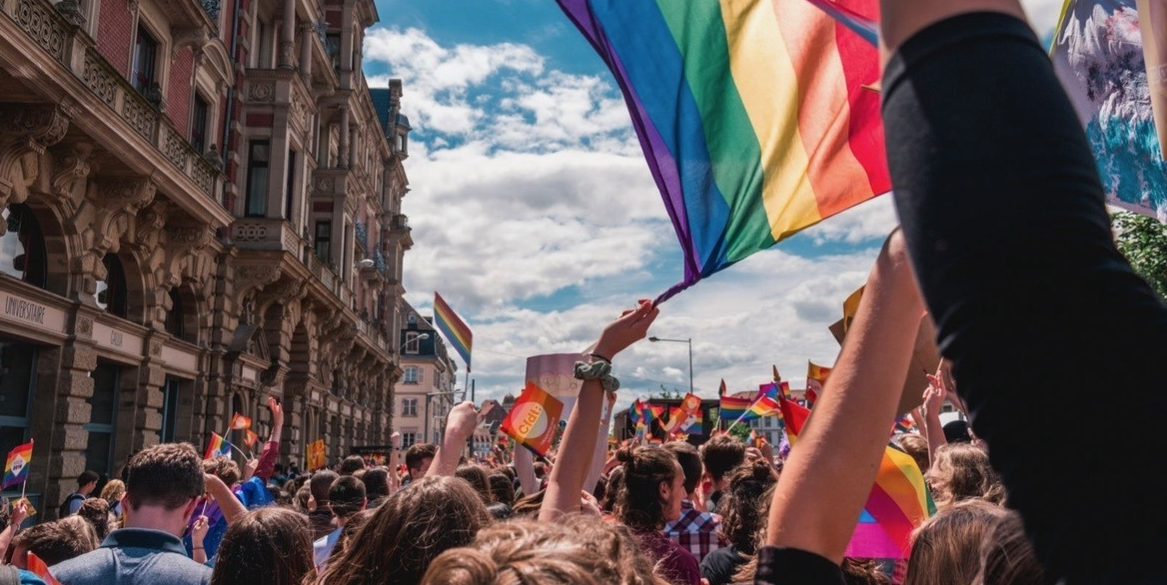Marching to the beat of the same drum: Pride protests across the globe
Over the past 50 years, Pride has become a staple in the British calendar. Around the world, numerous cities host marches in celebration of the LGBTQ+ community and in protest against their ongoing discrimination. 101 countries worldwide hosted Pride back in 2023, but in more than 70 others laws still allow persecution or discrimination of LGBTQ+ people. While in some more progressive countries Pride has become a joyous, festival-like celebration, in many others it remains a protest and is faced with political backlash.
UK
Following on from the legacy of Stonewall in 1969, the UK’s first Pride march was first held in London in 1972, attended by 2,000 people. London’s march is still the largest in the UK, with up to 1.5 million attendees in 2022. Recent efforts have sought to promote racial and ethnic intersectionality, with Stonewall UK partnering with Black Pride over Pride in London. With Pride in London transitioning from protest to parade, it relies on corporate sponsorships for “adequate facilities and securities” which has led to scrutiny.
South America: Argentina
In Argentina, Pride remains a vehicle of protest. In November 2023, 30 different places across the country hosted marches protesting the disappearance of a young trans man and against the far-right political candidate of the time. The national representative of ‘The Historics of Argentina’ describes Pride in her country as “vindicating those rights that gave us the freedom to walk and move through the streets freely” and expressing “the lack of equality and the rights that are yet to be conquered.”
Europe: Poland
Pride in Poland is part of LGBTQ+ organisations’ efforts against homophobia, bullying, and hate speech. Warsaw hosted a joint Kyiv-Warsaw Pride in 2020, “creating solidarity in the face of Russian aggression”. Activists have hope that the new government will address discriminatory practices: “We’ve been through a very rough time, but at the same time, we’re going out in the streets and saying we are stronger and we’re not going to give up,” said Miroslawa Makuchowska, from Campaign Against Homophobia. Poland’s last local authority ‘anti-LGBT+ resolution’ was recently repealed, down from a third of the country in September 2022.
Asia: The Philippines
Though Pride events have been held in the Philippines since the early 1990s, resistance is still strong. At Mendiola Pride in 2020, 20 attendees were victim of “illegal detention … a vicious mass arrest” and were later dubbed the ‘Pride 20’. Organiser Rey Valmores-Salinas said the incident “sparked a national conversation … not only about discrimination, but about state fascism, police brutality, and tyranny.” Numbers at Filipino Pride remain strong despite these events, with more than 110,000 in Quezon City in 2023.
Africa: South Africa
South Africa was the first African country to host Pride and has been doing so since 1990. The entire month of October is dedicated to events and celebrations in Johannesburg. Pride takes place in all nine provinces, not only the major cities of Cape Town and Johannesburg, but also ‘Alternative Prides’ that cater specifically to class and racial intersectionality. South African Pride is used as a protest tool on behalf of other African countries where discrimination is more prevalent. For example, in 2023, over 20,000 people in Johannesburg marched against the Ugandan Anti-Homosexuality Act, upheld last year.
North America: USA
‘The land of the free’ hosted protests against ‘extreme anti-LGBTQ+ bills’ in 2023, with one city having to cancel its Pride due to “fear of legal repercussions”. Todd Delmay, event chair of My Hollywood Pride said, “Merely having a Pride is a political statement, especially in this political climate.” With President Trump eliminating D.E.I initiatives, longtime corporate sponsors are withdrawing their support from Pride events, leaving organisers floundering.
Perhaps these examples show that the differences between ‘more’ and ‘less’ progressive countries are becoming fewer. Perhaps these differences never existed in the first place. As Audre Lorde famously said: “I am not free while any other woman is unfree, even when her shackles are very different from my own”. Whether it is a loud and proud festival or a silent march, Pride has always been a protest first and foremost and will continue to be until there is global equality.

Comments